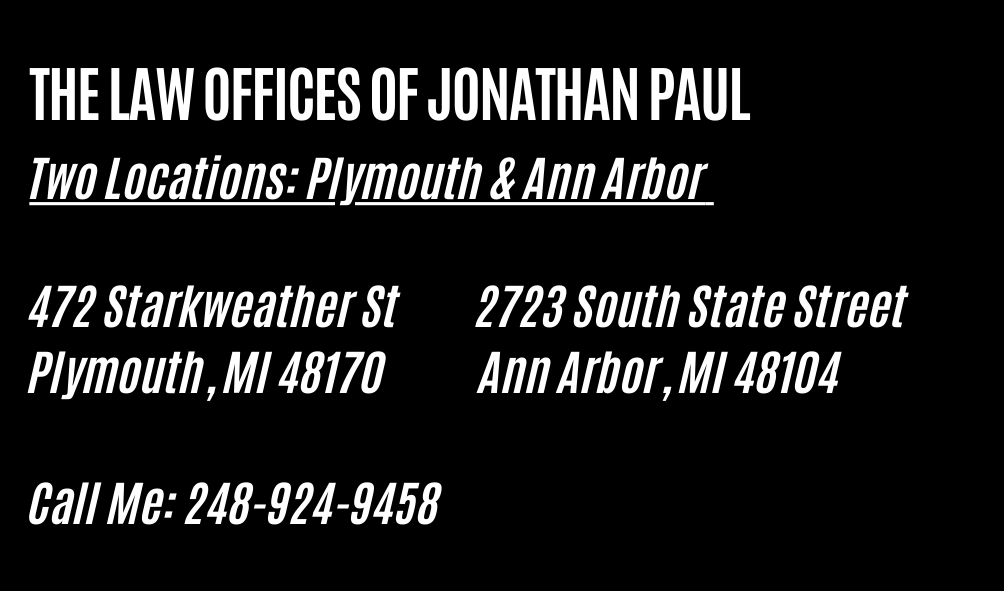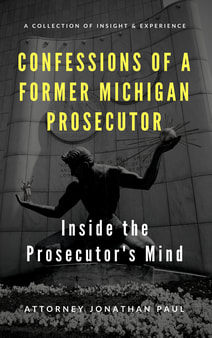|
1. What is the definition of a repeat offender?
“Repeat Offender” as used in the new legislation applies to persons who are eligible for vehicle plate confiscation and immobilization. This applies to any arrest for a 2nd alcohol or drug violation while operating a motor vehicle (convictions for murder, manslaughter, and negligent homicide with a vehicle are included in this calculation), or an arrest or citation for a 3rd violation while suspended or revoked. Convictions and suspension/revocation violations appearing on the driving record prior to October 1, 1999 will be used to determine eligibility for repeat offender status. 2. What are “violations of suspension/revocation” on the driving record? Mandatory additional suspension/revocation actions are imposed by the DOS for commission of any moving violation during a period of suspension/revocation. Look for language that looks like: “Addl Admin Denied and Revoked (MCL 257.904)” “Addl to Court Sup.” “Addl Admin Revocation (MCL 257.904)” “Addl Susp from (date)” “Addl to Court Revocation (MCL 257.904)” At the Stop 3. How does the police officer know a defendant is a “repeat offender”? At the time the officer requests a driving status on a 35;. If the LEIN/SOS message returns a “001" or more, in the prior “alcohol conviction” field and you are arresting for drunk driving, take the plate, destroy it, and issue a paper plate. If the LEIN/SOS message returns a “002" or more, in the “prior additional suspension/revocation” and you are arresting for DWLS, take the plate, destroy it, and issue a paper plate. The officer or the court can also run a new record that will list every conviction and/or action used to compute and determine whether a defendant is a repeat offender. When used in conviction with the driving record it is easy to see which entries are being counted. Use the following code: PRIOR;Z123456789123. (Substitute actual operator’s license number for example and follow with a period.) 4. Does the police department confiscate a leased, rental or commercial vehicle plate? What about out-of-state plates, tribal plates, or trailer plates. Yes, leased vehicle plates are confiscated. Neither rental, tribal, trailer, manufacturer, dealer, US government, nor out-of-state vehicle plates are confiscated. Commercial plates may be confiscated unless they are Apportioned- International Registration Plan plates. 5. If the metal plate is expired at the time of the stop, would a paper plate be issued? MSP plans to train their Troopers to issue the paper plate showing the expired date. This is because there is no authority to confiscate an expired plate. If the operator continues to drive the car without renewing the registration they could be re-ticketed for the expired plate. 6. What if the plate is improper or there is no plate on the vehicle? The improper plate should be removed and a paper plate is issued but not placed on the vehicle. For both an improper plate or no plate, officer should leave the plate number field on the paper plate blank. Law enforcement enters the VIN and other information into LEIN. The court gets their copy of the paper plate but does not enter anything in the plate number field. An NOA is issued on adjudication. Immobilization may be ordered. 7. What does the officer do if there is already a paper plate on the vehicle? The officer should take the previous paper plate off the vehicle and destroy it, then issue a new paper plate. Each adjudication gets a Notice of Adjudication. The drivers/defendants may be different for each paper plate. 8. Where is the vehicle going to be kept after the officer takes the plate? The vehicle may be driven away by a person not otherwise prohibited to operate a motor vehicle (i.e. not drunk, not suspended, etc.). If there is no person available to drive the vehicle, law enforcement may have the vehicle towed as they do now. In addition, vehicles may be towed if they were reported stolen or in accordance with local police practice. 9. When does a paper plate expire? The paper plate expires when the underlying plate expires or when adjudicated, whichever is sooner. If the underlying plate expires, the paper plate must be renewed at the branch office and a new paper plate will be issued. 10. How does the court know who the owner of a vehicle is? The court could request law enforcement to provide a registration status with ownership information along with the ticket or complaint and the paper plate. Or, the court could run this if they have LEIN or SOS access. 11. What if the plate is confiscated in error? If the error is discovered the same date as the confiscatio, simply delete the entry from the LEIN. If the error is not discovered until a later date, you may remove the flash by sending a message in through LEIN requesting a correction to the record that includes the year, make, VIN, plate number, and date of offense. Filing the Complaint 12. Can DWLS and OUIL be issued on a ticket? Citations may be issued for a 93-day misdemeanor for 1st offense written under the Michigan Vehicle Code or a substantially corresponding local ordinance. 2nd and subsequent offenses carrying penalties over 93 days should be filed on a complaint and warrant. 13. Can DWLS and OUIL be written under local ordinance? Yes, although cities and townships should amend their ordinances to provide for 93 day and immobilization penalties. 14. What if the prosecutor chooses to charge 1st offense when there are prior convictions on the record? This is the prosecutors prerogative. This would lesson the criminal penalties, but the license sanctions imposed by the Department of State will be based upon the driving record regardless of whether the defendant was convicted of 1st, 2nd, or 3rd offense. The court will receive no notice from SOS of the license action it takes. The defendant will receive a notice of the suspension or restrictions imposed with an effective date. 15. What if prints do not accompany the complaint from the police or prosecutor to the court? The court would be obligated to order fingerprints taken prior to sentencing. The prints would have to be updated with the appropriate CTN from the county prosecutor, in order to match to the judgment of sentence, dismissal/ acquittal, or nolle prosequi sent to MSP-Central Records. CTNs are not issued on ordinance violations. Convictions under ordinance for offenses with penalties up to 93 days must also be reported by submitting the original fingerprint card with a copy of the judgment of sentence, dismissal/acquittal or nolle prosequi form. Locations using LIVE SCAN submission of fingerprints should coordinate electronic submission of conviction information using the appropriate CTN or other local tracking number. 16. What if the prosecutor declines to authorize a complaint? How does the defendant get a new metal plate? The prosecutor has the obligation to notify law enforcement that charges will not be issued. The prosecutor and law enforcement will have to work out an agreement as to which agency has the responsibility to notify the defendant s/he may apply for a new metal plate. Either entity, may correct the LEIN entry which will clear the plate hold. 17. Will a fee be required to get a new plate if charges are not filed? The Department of State will charge a $5.00 replacement fee for a new plate regardless of whether the defendant was ever charged or was convicted, or the case was dismissed. 18. How does the owner get a new metal plate after the case is adjudicated? The court must provide the owner with an NOA (Notice of Adjudication) form. This is a combination form with the CORDL (Court Ordered Restricted Driver License). CORDLs will be used on pre October 1, 1999 alcohol cases and on all drug cases because the court will continue to impose license sanctions on these cases. On all new cases license sanctions will be imposed by the Secretary of State. The CORDL form will be used as an NOA on cases occurring after October 1st when a paper plate was issued. The owner may take this form to an SOS branch office to get a new metal plate. Sentencing - Immobilization 19. If the defendant is sentenced to jail, can the car be immobilized during that time? No. Immobilization must follow incarceration. See MCL 257.904d(6). 20. How does the court initiate immobilization, and how does the court determine that it occurred? SCAO new form MC-267, Order for Vehicle Immobilization is designed for the purpose of ordering immobilization. It contains a certification section by which the defendant can provide proof of compliance with the order. 21. Where are vehicles immobilized and who pays for it? There are various methods by which this can be accomplished. Any technology that locks the ignition, wheels, or steering of the vehicle, or otherwise prevents any person from operating the vehicle, or that prevents the defendant from operating the vehicle may be used. The court may order the vehicle stored at a location and in a manner it considers appropriate. Costs for immobilization may be ordered paid by the defendant. The court might wish to provide defendants with a specific place to have a vehicle immobilized, such as an impound lot, or it might wish to provide a list of choices and require the order to be returned completed as verification. Local circumstances and availability of locked storage lots or other means of immobilization will impact these decisions. 22. How much time does the defendant have to prove the vehicle is immobilized? What if the defendant fails to provide proof of immobilization? Each court must determine how much time to provide for immobilization, and how it will proceed if no proof is provided. The court could set a specific date by which immobilization must occur, or if facilities are available, make it immediate (other than when incarcerated). There could be an Order to Show Cause, with a subsequent Order for Vehicle Impoundment(MC-254) and/or a Bench Warrant for failure to comply with a court order or a condition of probation. 23. How can an innocent owner address the court regarding possible immobilization? One way could be that the innocent owner files a motion to prove they did not knowingly allow the offender to operate. Each court should determine at what stage it wants to decide this issue; before sentencing or at sentencing and how the judge will make that determination. 24. Will the LEIN/SOS response on a vehicle status inquiry indicate a vehicle has been immobilized? Yes. It will show the dates of immobilization along with the DLN of the offender. 25. If defendant uses immobilization tether technology that prevents only him/herself from driving the vehicle, how will law enforcement know that a non-defendant is legally operating the vehicle? The driver license number of the defendant will appear on the registration record for the vehicle ordered immobilized. If a vehicle is driven by someone other than the defendant, law enforcement is being trained to inquire as to why the vehicle isn’t immobilized. The driver then should have documentation to show the officer identifying the tether technology has been installed or a copy of the Order of Immobilization. 26. Who monitors the defendant during immobilization to make sure s/he does not purchase or lease another vehicle? During immobilization the offender may not purchase or lease another vehicle. Only the offending vehicle is affected by the immobilization order. SOS will monitor for no transfer to a family member. It is a crime to purchase or lease a new vehicle and the defendant will be subject to prosecution. 27. Is there any mandatory jail time? For a 2nd offense OUIL/OWI within 7 years there is either a minimum of 5 days in jail or a minimum 30 days community service. For a 3rd offense OUIL/OWI within 10 years there is either a mandatory 1 year jail, or with probation, a mandatory 30 days jail. 28. How are suspensions and restrictions applied to the driving record, and how is the driver notified? Upon receipt of the conviction abstract the Department of State will impose the minimum license sanctions. Restrictions will be the broadest possible under the statute, and the defendant will be required to carry documentation proving their reason for driving (such as letter from employer, school schedule, doctor’s appointment card, etc.). The driver is notified by letter by DOS. 29. How is vehicle forfeiture handled? This procedure is outlined in MCL 257.625n, and is initiated by the prosecutor. There are several SCAO forms; MC-66, MC-68, and MC-69. If the court orders forfeiture the unit of government that seized the vehicle sells it and disposes of the proceeds according to statute. 30. If a defendant has been denied the ability to register a vehicle who will check to see if s/he tries to purchase or lease another vehicle during the denial period? It will be a crime for a person to purchase or lease another vehicle. Any person suspended or revoked for a 3rd drunk driving or 4th DWLS will be denied the ability to transfer a vehicle to a family member without a court order. 31. Will specific restrictions (work hours, etc. appear on the driving record for license restrictions? No. These will only appear for old law cases. Any offense occurring on or after 10/1/99 will receive “generic” restrictions and the operator must carry proof of destination and hours with them. 32. When the LEIN/SOS driver status response indicates the operator may only drive a vehicle with an ignition interlock device, what does this mean? When repeat alcohol offenders are returned to the road with a restricted license, hearing officers must place them on an ignition interlock device for a minimum of one year. This device requires a person take and pass a breath test before operating a vehicle. https://www.michigan.gov/documents/Repeat_Offender_8731_7.pdf Comments are closed.
|
Click to Email Me Categories
All
|
Ann Arbor Office LocationPlymouth Office Location |
Representing DUI Clients in MichiganRepresenting clients charged with a DUI in Ann Arbor, Canton, Brighton, Howell, Saline, Adrian, Taylor, Plymouth, Northville, Westland, Ypsilanti, Pittsfield Towsnhip, Warren, Sterling Heights, Farmington, Pontiac, Romulus, Lansing, Novi, South Lyon, Southfield, Birmingham, Bloomfield Hills, Royal Oak, Troy, Rochester, Jackson, East Lansing, Garden City, Livonia, Dearborn, Detroit, St Clair Shores, Hazel Park, Ferndale, Madison Heights, Waterford, Milford, Shelby Township Clarkston, Oak Park, Berkley, Fraser, Sterling Heights, Clinton Township and others throughout Washtenaw, Wayne, Monroe, Jackson, Genesee, Macomb, Ingham, Lenawee, Livingston and Oakland County.
|








